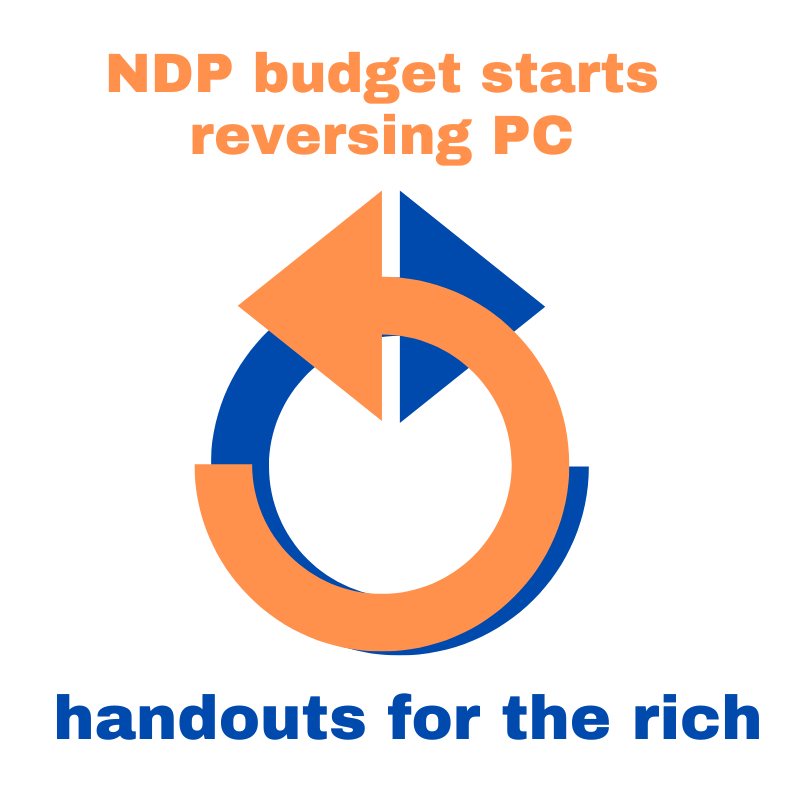Previously published in the Winnipeg Free Press April 18, 2024

AS has been called out by academics, activists, community organizations and unions, the massive tax cuts implemented by the previous Progressive Conservative (PC) government were highly inequitable and should have been rescinded. Budget 2024 takes some important steps on targeting government support to those who need it and having the wealthy pay their fair share to help ensure Manitoba has the revenues needed to fund health, education and other public services.
The biggest change in Budget 2024 is to school tax credits. For decades, Manitoba had a capped school tax credit that reduced taxes owed by a maximum of $700 as recently as 2020. Renters benefited from an equivalent $700 credit on their tax returns to help them with housing costs. When the PCs in 2021 decided to further rebate school taxes, instead of increasing the existing credit, they came up with a second rebate program. Having two programs increased administrative costs, especially since the new program mailed cheques to people instead of reducing taxes owed.
The main problem with the new PC school tax rebate, however, was that it was highly inequitable from a needs-based perspective. Renters were no longer eligible, but landlords and other commercial property owners were (the following year, the PCs introduced a lower $525 tax credit for renters). The new program also did not cap maximum benefits. This led to massive benefits going to the owners of valuable properties while working- and middle-class households got much less. For example, in the first year, the owners of Polo Park Mall were eligible for a rebate of over $1 million, and an owner of a mansion in Winnipeg’s Tuxedo neighbourhood received a benefit of over $6,000, while the average Winnipeg household got $458. These inequities only worsened from 2021 to 2024 as the credit doubled to cover 50 per cent of residential school taxes.
The new NDP program reverses the most egregious elements of the PC rebate that provided massive tax cuts for wealthy property owners by replacing the school tax credit and reverting to a capped model, maxing out at $1,500 per household. While benefits do increase with property values under the NDP program, the maximum benefit is reached at a property value of approximately $285,000. These changes are expected to bring in an additional $148 million in revenue.
The second revenue measure in Budget 2024 is the clawing back of the Basic Personal Amount (BPA), a tax credit that excludes a fixed amount of income ($15,780 in 2024) for all tax filers from taxation. Tax filers with incomes over $200,000 will gradually lose this credit, with the full credit being clawed back at $400,000 of income. Since the clawback kicks in at such a high income and phases out slowly, this measure raises a relatively small amount of revenue (around $15 million). Future budgets should build on this important change to the BPA and claw back this tax credit at lower income levels and at a faster rate.
While these measures to increase revenues are a good first step, it’s important to note they only make up for a small portion (about 10 per cent) of the $1.6 billion in tax cuts implemented by the PC government from 2016 to 2023. This larger undermining of provincial revenues has created a large structural deficit that leaves the province vulnerable. Budget 2024 forecasts record lows for own-source revenues in 2023-24 in relation to the size of the economy, and these tax changes barely alter this metric for 2024-25. The changes also leave in place the vast majority of income tax cuts that provide the greatest benefit to the highest income earners.
Fortunately, the province has benefited from ever-growing federal transfers from the Trudeau Liberals, which have obscured the impact of falling own-source revenues for several years. A change to a Poilievre-led Conservative federal government, as polls are predicting, would place this generosity at risk.
The Manitoba government would be well-advised to view these tax changes in 2024 as a first step in making our tax system more equitable. Manitoba should continue to exclude corporations and landlords from education property tax credits, particularly given that Manitoba is the only province with a zero per cent tax rate for small businesses and has the most generous private market housing support in the country through the Rent Assist program. Budget 2025 should apply tax credits to working and middle- class households who are genuinely in need while clawing back tax cuts for the rich to support health, education and other public services in desperate need of repair after years of austerity. The Manitoba government has accomplished some important revenue measures in this first budget, but there is more to do.
Jesse Hajer is a faculty member in the department of economics and labour studies at the University of Manitoba and a research associate with the Canadian Centre for Policy Alternatives — Manitoba.


